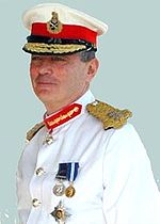
Governor of Gibraltar
Encyclopedia
The Governor and Commander-in-Chief of Gibraltar is the representative of the British monarch in the British overseas territory
of Gibraltar
. The Governor is appointed by the British Monarch
on the advice of the British Government. The role of the Governor is to act as the de facto
head of state
, and he or she is responsible for formally appointing the Chief Minister of Gibraltar
, along with other members of the Government of Gibraltar after a general election
. The Governor also has sole responsibility for defence and security.
The incumbent Governor is Vice Admiral Sir Adrian Johns KCB, CBE, ADC
, who succeeded his predecessor Lieutenant General Sir Robert Fulton KBE on 26 October 2009
To date there has been no female Governor of Gibraltar, other than in an acting position.
The Governor has his own flag in Gibraltar, the Union Flag
defaced
with the territory's coat of arms
. However at his official residence (The Convent
), the Union flag and the flag of Gibraltar
are flown.
British overseas territories
The British Overseas Territories are fourteen territories of the United Kingdom which, although they do not form part of the United Kingdom itself, fall under its jurisdiction. They are remnants of the British Empire that have not acquired independence or have voted to remain British territories...
of Gibraltar
Gibraltar
Gibraltar is a British overseas territory located on the southern end of the Iberian Peninsula at the entrance of the Mediterranean. A peninsula with an area of , it has a northern border with Andalusia, Spain. The Rock of Gibraltar is the major landmark of the region...
. The Governor is appointed by the British Monarch
Monarchy of the United Kingdom
The monarchy of the United Kingdom is the constitutional monarchy of the United Kingdom and its overseas territories. The present monarch, Queen Elizabeth II, has reigned since 6 February 1952. She and her immediate family undertake various official, ceremonial and representational duties...
on the advice of the British Government. The role of the Governor is to act as the de facto
De facto
De facto is a Latin expression that means "concerning fact." In law, it often means "in practice but not necessarily ordained by law" or "in practice or actuality, but not officially established." It is commonly used in contrast to de jure when referring to matters of law, governance, or...
head of state
Head of State
A head of state is the individual that serves as the chief public representative of a monarchy, republic, federation, commonwealth or other kind of state. His or her role generally includes legitimizing the state and exercising the political powers, functions, and duties granted to the head of...
, and he or she is responsible for formally appointing the Chief Minister of Gibraltar
Chief Minister of Gibraltar
The Chief Minister of Gibraltar is the leader of the largest party elected to the Gibraltar Parliament, and is formally appointed by the Governor of Gibraltar, representative of the British Crown.-List of Chief Ministers:...
, along with other members of the Government of Gibraltar after a general election
Elections in Gibraltar
Elections in Gibraltar gives information on election and election results in Gibraltar.Gibraltar elects on national level a legislature. The Gibraltar Parliament has 17 members, all elected for a four year term in one constituency with each voter getting to vote for their selection of eight...
. The Governor also has sole responsibility for defence and security.
The incumbent Governor is Vice Admiral Sir Adrian Johns KCB, CBE, ADC
Adrian Johns
Vice Admiral Sir Adrian James Johns KCB, CBE, KStJ, ADC is the current Governor of Gibraltar and a former senior officer in the Royal Navy. His most senior naval posting was as Second Sea Lord from 2005 to 2008.-Career:...
, who succeeded his predecessor Lieutenant General Sir Robert Fulton KBE on 26 October 2009
To date there has been no female Governor of Gibraltar, other than in an acting position.
The Governor has his own flag in Gibraltar, the Union Flag
Union Flag
The Union Flag, also known as the Union Jack, is the flag of the United Kingdom. It retains an official or semi-official status in some Commonwealth Realms; for example, it is known as the Royal Union Flag in Canada. It is also used as an official flag in some of the smaller British overseas...
defaced
Defacement (flag)
Defacement is a term used in heraldry and vexillology to refer to the addition of a symbol or charge to another flag. For example, the Australian flag is the British Blue Ensign defaced with the Southern Cross in the fly and the Commonwealth Star in the lower hoist quarter, beneath the Union...
with the territory's coat of arms
Coat of arms of Gibraltar
The coat of arms of Gibraltar was first granted by a Royal Warrant passed in Toledo on July 10, 1502, by Isabella I of Castile during Gibraltar's Spanish period...
. However at his official residence (The Convent
The Convent (Gibraltar)
The Convent has been the official residence of the Governor of Gibraltar since 1728. It was originally a convent of Franciscan friars, hence its name, and was completed in 1531....
), the Union flag and the flag of Gibraltar
Flag of Gibraltar
The flag of Gibraltar is an elongated banner of the coat of arms of Gibraltar, granted by Royal Warrant Queen Isabella I of Castile on 10 July 1502.-Description:...
are flown.
List of Governors of Gibraltar since the Habsburg occupation
(Dates in italics indicate de facto continuation of office)Habsburg occupation (1704)
| Picture | Term | Incumbent | Notes |
|---|---|---|---|
| |24 July 1704 | Habsburg occupation | ||
 |
24 July 1704 to 4 August 1704 | Sir George Rooke George Rooke Admiral of the Fleet Sir George Rooke was an English naval commander. He is known for his service in the wars against France and particularly remembered today for his victory at Vigo Bay and for capturing Gibraltar for the British in 1704.-Early life:Rooke was born at St Lawrence, near Canterbury... , Military commander Commander Commander is a naval rank which is also sometimes used as a military title depending on the individual customs of a given military service. Commander is also used as a rank or title in some organizations outside of the armed forces, particularly in police and law enforcement.-Commander as a naval... |
|
 |
4 August 1704 to 6 August 1704 | Prince George of Hesse-Darmstadt Prince George of Hesse-Darmstadt Prince George Louis of Hesse-Darmstadt was a Field Marshal in the Austrian army. He is known for his career in Habsburg Spain, as Viceroy of Catalonia , head of the Austrian army in the War of Spanish Succession and governor of Gibraltar in 1704... , Governor |
Appointed by Archduke Charles Charles VI, Holy Roman Emperor Charles VI was the penultimate Habsburg sovereign of the Habsburg Empire. He succeeded his elder brother, Joseph I, as Holy Roman Emperor, King of Bohemia , Hungary and Croatia , Archduke of Austria, etc., in 1711... |
| |6 August 1704 to November 1704 | Henry Nugent, Count of Valdesoto Henry Nugent Henry Nugent, Count of Valdesoto and Viscount Coolamber was an Irish military man. He was the third Governor of Gibraltar during the Habsburg occupation... , Governor |
Appointed by Archduke Charles | |
| |24 December 1704 to 24 December 1707 | John Shrimpton John Shrimpton -Military career:Shrimpton joined the Army becoming a Major in the 1st Foot Guards.In 1693, during the Nine Years' War, he was wounded at the Battle of Landen in Flanders... , Governor |
Appointed by Archduke Charles | |
| 24 December 1707 to 24 January 1711 | Roger Elliott Roger Elliott Major General Roger Elliott was one of the earliest British Governors of Gibraltar. His nephew George Augustus Eliott also became a noted Governor and defender of Gibraltar.... , Governor |
||
| |24 January 1711 to 13 July 1713 | Thomas Stanwix Thomas Stanwix Brigadier General Thomas Stanwix was a British Army officer, politician and Governor of Gibraltar.-Career:Stanwix joined the Army and had become a Captain-Lieutenant in Hasting's Foot Regiment by 1692. In March 1702 he was elected Member of Parliament for Carlisle... , Governor |
Treaty of Utrecht (1713)
| Picture | Term | Incumbent | Notes |
|---|---|---|---|
| |13 July 1713 | Spain cedes Gibraltar to Great Britain in the Treaty of Utrecht Treaty of Utrecht The Treaty of Utrecht, which established the Peace of Utrecht, comprises a series of individual peace treaties, rather than a single document, signed by the belligerents in the War of Spanish Succession, in the Dutch city of Utrecht in March and April 1713... |
||
| |13 July 1713 to 7 August 1713 | Thomas Stanwix Thomas Stanwix Brigadier General Thomas Stanwix was a British Army officer, politician and Governor of Gibraltar.-Career:Stanwix joined the Army and had become a Captain-Lieutenant in Hasting's Foot Regiment by 1692. In March 1702 he was elected Member of Parliament for Carlisle... , Governor |
||
 |
7 August 1713 to 20 October 1720 | The Earl of Portmore David Colyear, 1st Earl of Portmore General David Colyear, 1st Earl of Portmore KT PC was a Scottish general and Governor of Gibraltar-Military career:... , Governor |
|
| |20 October 1720 to 2 February 1727 | Richard Kane Richard Kane Brigadier General Richard Kane was a British Army General.-Origins:Born to Thomas O'Cahan and his wife, Margaret Dobbin, at his mother's home in Duneane, County Antrim, Ireland, in December 1662... , Governor |
||
| |2 February 1727 to 13 May 1730 | Jasper Clayton Jasper Clayton Lieutenant General Jasper Clayton was Governor of Gibraltar.-Military career:Born the son of George Clayton and Hester Palmer, Jasper Clayton lived at Fernhill in Buckinghamshire. He chose to join the Army and climbed the ranks to become a Lieutenant General... , Governor |
||
| |15 May 1730 to 24 October 1739 | Joseph Sabine, Governor | ||
| |24 October 1739 to 22 April 1740 | Francis Columbine, Governor | ||
| |22 April 1740 to 1749 | William Hargrave William Hargrave Lieutenant General William Hargrave was Governor of Gibraltar.-Military career:Hargrave was commissioned into Viscount Charlemonte’s Regiment of Foot in 1694... , Governor |
||
| |1749 to 31 May 1754 | Humphrey Bland Humphrey Bland Lieutenant General Humphrey Bland was a British Army general who commanded the cavalry at the Battle of Culloden.-Military career:Bland was commissioned as an ensign in 1704... , Governor |
||
| |31 May 1754 to 12 July 1756 | Thomas Fowke Thomas Fowke Lieutenant General Thomas Fowke was a British Army officer who was appointed Governor of Gibraltar.-Early years:He was the son of John Fowke, Esq. and descended from the Fowkes of Brewood and Gunston, in South Staffordshire.... , Governor |
||
 |
12 July 1756 to 16 April 1757 | The Lord Tyrawley, Governor | |
| |16 April 1757 to 28 April 1761 | The Earl of Home William Home, 8th Earl of Home Lieutenant General Sir William Home, 8th Earl of Home was the eighth holder of the title of Earl of Home.-Military career:... , Governor |
||
| |28 April 1761 to 23 June 1761 | John Toovey, acting Governor | ||
| |13 June 1761 to 14 June 1761 | John Parslow, acting Governor | ||
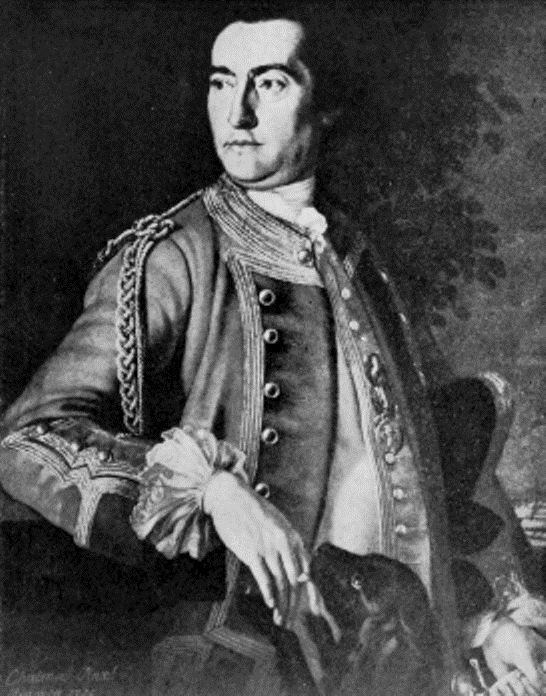 |
14 June 1761 to January 1776 | Edward Cornwallis Edward Cornwallis Lieutenant General Edward Cornwallis was a British military officer who founded Halifax, Nova Scotia with 2500 settlers and later served as the Governor of Gibraltar.-Early life:... , Governor |
|
| |1765 to 1767 | John Irwin John Irwin (British Army officer) General Sir John Irwin KB was a British Army officer.-Career:Educated in Ireland, Irwin was commissioned into the 5th Regiment of Foot in 1736... , acting Governor |
||
| |January 1776 to 25 May 1777 | Robert Boyd, acting Governor | 1st Term | |
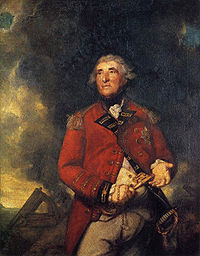 |
25 May 1777 to 14 June 1787 | George Augustus Eliott George Augustus Eliott, 1st Baron Heathfield George Augustus Eliott, 1st Baron Heathfield, KB was a British Army officer who took served in three major wars during the eighteenth century. He rose to distinction during the Seven Years War when he fought in Germany and participated in the British attacks on Belle Île and Cuba... , Governor |
|
 |
14 June 1787 to July 1790 | The Lord Heathfield George Augustus Eliott, 1st Baron Heathfield George Augustus Eliott, 1st Baron Heathfield, KB was a British Army officer who took served in three major wars during the eighteenth century. He rose to distinction during the Seven Years War when he fought in Germany and participated in the British attacks on Belle Île and Cuba... , Governor |
|
| |July 1790 to October 1790 | Sir Robert Boyd, acting Governor | ||
| |October 1790 to 13 May 1794 | Sir Robert Boyd, Governor | 2nd Term | |
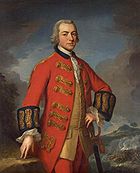 |
1794–1795 | Henry Clinton, Governor | Died in London before taking up the post |
| |13 May 1794 to 30 December 1795 | Charles Rainsford Charles Rainsford General Charles Rainsford was a British Army officer.-Career:He was the second son of alderman Francis Rainsford and his wife, Isabella and received his first education from a cleric friend of Francis's at Great Clacton... , Governor |
||
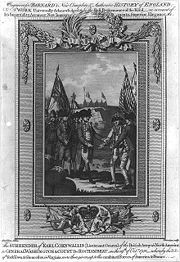 |
30 December 1795 to 25 February 1802 | Charles O'Hara Charles O'Hara General Charles O'Hara was a British military officer who served in the Seven Years War, American War of Independence, and French Revolutionary War, and later served as Governor of Gibraltar... , Governor |
|
| |25 February 1802 to 10 May 1802 | Charles Barnett, Governor | ||
 |
24 May 1802 to 23 January 1820 | The Duke of Kent | |
| |2 May 1803 to 17 December 1804 | Sir Thomas Trigge, acting Governor | For the Duke of Kent | |
| 17 December 1804 to June 1806 | Henry Edward Fox Henry Edward Fox General Henry Edward Fox was a British Army general. He also served for a brief spell as Governor of Minorca.-Family:... , acting Governor |
For the Duke of Kent | |
| |June 1806 to November 1806 | James Drummond, acting Governor | 1st Term; for the Duke of Kent | |
 |
November 1806 to August 1808 | Sir Hew Dalrymple Sir Hew Dalrymple, 1st Baronet, of High Mark General Sir Hew Whitefoord Dalrymple, 1st Baronet was a British Army general and Governor of Gibraltar.-Military career:... , acting Governor |
For the Duke of Kent |
| |August 1808 to May 1809 | James Drummond, acting Governor | 2nd Term; for the Duke of Kent | |
 |
May 1809 to August 1809 | Sir John Cradock John Cradock, 1st Baron Howden General John Francis Cradock, 1st Baron Howden GCB was a British peer, politician and soldier.-Life:He was son of John Cradock, Church of Ireland Archbishop of Dublin.... , acting Governor |
For the Duke of Kent |
| |August 1809 to October 1809 | John Smith, acting Governor | For the Duke of Kent | |
| |October 1809 to November 1809 | Alex McKenzie Fraser, acting Governor | For the Duke of Kent | |
| |November 1809 to 2 April 1814 | Colin Campbell Colin Campbell (British Army officer) Lieutenant General Colin Campbell was Lieutenant Governor of Gibraltar.-Military career:Campbell was commissioned into the 71st Regiment of Foot in 1771 and then transferred to the 6th Regiment of Foot in 1783. In 1796 he went to Ireland and fought, two years later, at the Battle of Vinegar... , acting Governor |
For the Duke of Kent | |
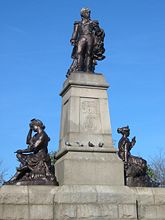 |
3 April 1814 to 15 November 1821 | Sir George Don George Don (British Army officer) General Sir George Don GCB, GCH was a senior British Army military officer and colonial governor during the late eighteenth and early nineteenth centuries... , acting Governor |
1st Term; for the Duke of Kent |
 |
29 January 1820 to 1835 | The Earl of Chatham John Pitt, 2nd Earl of Chatham General John Pitt, 2nd Earl of Chatham, KG, PC was a British peer and soldier.-Career:He was the eldest son of William Pitt the Elder and an elder brother of William Pitt the Younger... , Governor |
|
 |
7 June 1825 to 20 June 1830 | Sir George Don, acting Governor | 2nd Term; for the Earl of Chatham |
Crown colony (1830)
| Picture | Term | Incumbent | Notes |
|---|---|---|---|
| |1830 | Gibraltar becomes a British Crown colony Crown colony A Crown colony, also known in the 17th century as royal colony, was a type of colonial administration of the English and later British Empire.... |
||
 |
20 June 1830 to 10 May 1831 | Sir George Don, acting Governor | 2nd Term; for the Earl of Chatham |
| |10 May 1831 to 29 May 1835 | Sir William Houston Sir William Houston, 1st Baronet General Sir William Houston, 1st Baronet, GCB, GCH was a General in the British Army and the Governor of Gibraltar.-Military career:... , acting Governor |
For the Earl of Chatham | |
| |28 February 1835 to 11 October 1842 | Sir Alexander Woodford, Governor | ||
 |
11 October 1842 to 12 December 1848 | Sir Robert Wilson Robert Thomas Wilson General Sir Robert Thomas Wilson Kt was a British general and politician who served in Egypt, Prussia, and was seconded to the Imperial Russian Army in 1812. He sat as the Liberal Member of Parliament for Southwark from 1818 to 1831... , Governor |
|
| 12 December 1848 to 26 July 1855 | Sir Robert Gardiner Robert Gardiner (British Army officer) General Sir Robert Gardiner GCB GCH was Master Gunner, St James's Park, the most senior Ceremonial Post in the Royal Artillery after the Sovereign.-Military career:... , Governor |
||
| |26 July 1855 to 5 May 1859 | Sir James Fergusson James Fergusson (British Army officer) General Sir James Fergusson, KCB was a British Army officer during the Napoleonic Wars and the Governor of Gibraltar from 1855 to 1859.-Military career:... , Governor |
||
| 5 May 1859 to 21 September 1865 | Sir William Codrington William John Codrington General Sir William John Codrington GCB was a British general and politician who served in the Crimean War.-Military career:... , Governor |
||
| 21 September 1865 to 25 July 1870 | Sir Richard Airey Richard Airey, 1st Baron Airey General Richard Airey, 1st Baron Airey GCB , known as Sir Richard Airey between 1855 and 1876, was a British general.-Background:... , Governor |
||
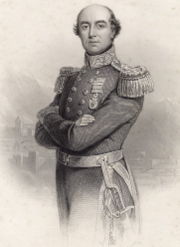 |
25 July 1870 to 23 June 1876 | Sir William Williams, Governor | |
 |
23 June 1876 to 3 January 1883 | The Lord Napier of Magdala Robert Napier, 1st Baron Napier of Magdala Field Marshal Robert Cornelis Napier, 1st Baron Napier of Magdala, GCB, GCSI, CIE, FRS was a British soldier.-Early life:... , Governor |
|
| 3 January 1883 to 2 November 1886 | Sir John Miller Adye John Miller Adye General Sir John Miller Adye GCB was a British general.-Military career:Born the son of Major James P. Adye, he was born at Sevenoaks, Kent, on 1 November 1819... , Governor |
||
| |2 November 1886 to 23 August 1890 | Sir Arthur Hardinge Arthur Edward Hardinge General Sir Arthur Edward Harding KCB CIE was Governor of Gibraltar.-Military career:Born the second son of Henry Hardinge, 1st Viscount Hardinge and educated at Eton College, Hardinge was commissioned into the 41st Regiment of Foot in 1844. He was quickly appointed Aide-de-Camp to his father,... , Governor |
||
| |23 August 1890 to 27 January 1891 | Sir Leicester Smyth Leicester Smyth Lieutenant General Sir Leicester Smyth KCB KCMG was Governor of Gibraltar.-Military career:... , Governor |
||
| |27 January 1891 to 31 March 1891 | H. R. L. Newdigate, acting Governor | ||
| 31 March 1891 to 27 June 1893 | Sir Lothian Nicholson Lothian Nicholson Lieutenant-General Sir Lothian Nicholson KCB was Governor of Gibraltar.-History:Educated at Mr Malleson's School in Hove and at the Royal Military Academy, Woolwich, Nicholson was commissioned into the Royal Corps of Engineers in 1846. In 1855 he was sent to the Crimean War where he took part in... , Governor |
||
| |27 June 1893 to 7 August 1893 | G.J. Smart, acting Governor | ||
| |7 August 1893 to 22 May 1900 | Sir Robert Biddulph Robert Biddulph (British Army officer) General Sir Robert Biddulph GCB GCMG was Quartermaster-General to the Forces.-Military career:Educated at Twyford School and the Royal Military Academy, Woolwich, Biddulph was commissioned into the Royal Artillery in 1853. He served in the Crimean War and was present at the Siege of Sevastopol in... , Governor |
||
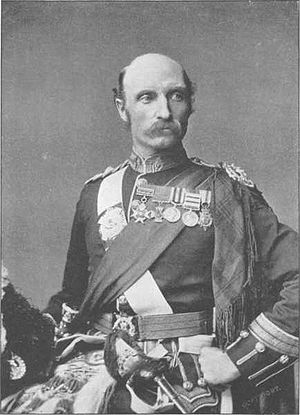 |
22 May 1900 to 1 August 1905 | Sir George Stuart White, Governor | |
| 1 August 1905 to 30 July 1910 | Sir Frederick Forestier-Walker Frederick Forestier-Walker General Sir Frederick William Edward Forestier Forestier-Walker GCMG KCB was Governor of Gibraltar.-Military career:... , Governor |
||
 |
30 July 1910 to 11 July 1913 | Sir Archibald Hunter Archibald Hunter General Sir Archibald Hunter GCB GCVO DSO was a General in the British Army who distinguished himself during the Boer War... , Governor |
|
| 11 July 1913 to 9 July 1918 | Sir Herbert Miles Herbert Miles Lieutenant General Sir Herbert Scott Gould Miles GCB GCMG GBE CVO was Quartermaster-General to the Forces.-Military career:Miles was commissioned into the 101st Regiment of Foot in 1869.... , Governor |
||
 |
9 July 1918 to 26 May 1923 | Sir Horace Smith-Dorrien Horace Smith-Dorrien General Sir Horace Lockwood Smith-Dorrien GCB, GCMG, DSO, ADC was a British soldier and commander of the British II Corps and Second Army of the BEF during World War I.-Early life and career:... , Governor |
|
| 26 May 1923 to 13 August 1928 | Sir Charles Monro Sir Charles Monro, 1st Baronet General Sir Charles Carmichael Monro, 1st Baronet of Bearcrofts, GCB, GCSI, GCMG, was a British Army General during World War I and Governor of Gibraltar from 1923 to 1929.-Military career:... , Governor |
||
 |
13 August 1928 to 13 May 1933 | Sir Alexander Godley Alexander Godley General Sir Alexander John Godley GCB, KCMG was a First World War general, best known for his role as commander of the New Zealand Expeditionary Force... , Governor |
|
| 13 May 1933 to 12 August 1938 | Sir Charles Harington Harington Charles Harington Harington General Sir Charles Harington Harington GCB, GBE, DSO, DCL , was a British Army officer most noted for his service during the First World War and Chanak crisis... , Governor |
||
| 12 August 1938 to 11 July 1939 | Sir Edmund Ironside Edmund Ironside, 1st Baron Ironside Field Marshal William Edmund Ironside, 1st Baron Ironside GCB, CMG, CBE, DSO, was a British Army officer who served as Chief of the Imperial General Staff during the first year of the Second World War.... , Governor |
||
| |11 July 1939 to 14 May 1941 | Sir Clive Gerard Liddell Clive Gerard Liddell General Sir Clive Gerard Liddell KCB CMG CBE DSO was Adjutant-General to the Forces of the British Army.-Military career:Clive Liddell joined the British Army in 1902. He was an Adjutant from 1908 to 1911 and then became Staff Captain at 6th District of Northern Command in 1912... , Governor |
||
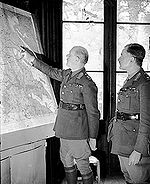 |
14 May 1941 to 31 May 1942 | The Viscount Gort John Vereker, 6th Viscount Gort Field Marshal John Standish Surtees Prendergast Vereker, 6th Viscount Gort, VC, GCB, CBE, DSO & Two Bars, MVO, MC , was a British and Anglo-Irish soldier. As a young officer in World War I he won the Victoria Cross at the Battle of the Canal du Nord. During the 1930s he served as Chief of the... , Governor |
|
| 31 May 1942 to 14 February 1944 | Sir Noel Mason-Macfarlane Noel Mason-Macfarlane Lieutenant General Sir Frank Noel Mason-Macfarlane, KCB, DSO, MC was a British soldier, administrator and politician who served as Governor of Gibraltar during World War II.-Military career:... , Governor |
||
| |14 February 1944 to 8 February 1947 | Sir Ralph Eastwood Ralph Eastwood Lieutenant General Sir Thomas Ralph Eastwood KCB DSO MC was a British Army General during World War II.-Military career:Ralph Eastwood was commissioned into the Rifle Brigade in 1910... , Governor |
||
 |
8 February 1947 to 23 April 1952 | Sir Kenneth Anderson Kenneth Arthur Noel Anderson General Sir Kenneth Arthur Noel Anderson, KCB, MC was a British Army officer in both the First and Second World Wars. He is mainly remembered as the commander of the First Army during Operation Torch, the Allied invasion of Tunisia. He had an outwardly reserved character and did not court... , Governor |
|
| |23 April 1952 to 6 May 1955 | Sir Gordon MacMillan Gordon Holmes MacMillan General Sir Gordon Holmes Alexander MacMillan, Lord MacMillan of MacMillan of Knap, KCB, KCVO, CBE, DSO and MC with two bars was a British General who commanded several British Army divisions during World War II and who was decorated for bravery in World War I... , Governor |
||
| |6 May 1955 to 16 April 1958 | Sir Harold Redman Harold Redman Lieutenant General Sir Harold Redman, KCB, CBE was an officer in the British Indian Army during World War II and the post-war era.-Military career:... , Governor |
||
| 16 April 1958 to 8 June 1962 | Sir Charles Keightley Charles Keightley General Sir Charles Frederic Keightley, GCB, GBE, DSO was a senior officer in the British Army during and following World War II.-Military career:... , Governor |
||
| |8 June 1962 to 5 August 1965 | Sir Alfred Ward Alfred Dudley Ward General Sir Alfred Dudley Ward, GCB, KBE, DSO , was a British Army officer during the Second World War and later Governor of Gibraltar. He served as an ordinary soldier for three years before being sent for officer training in 1926... , Governor |
||
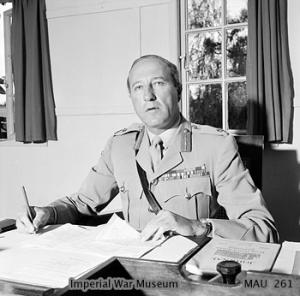 |
5 August 1965 to March 1969 | Sir Gerald Lathbury Gerald Lathbury General Sir Gerald William Lathbury, GCB, DSO, MBE was a British Army officer during the Second World War and later became Governor of Gibraltar-Military career:... , Governor |
|
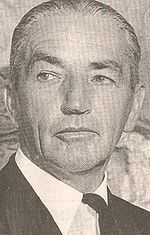 |
March 1969 to 3 October 1973 | Sir Varyl Begg Varyl Begg Admiral of the Fleet Sir Varyl Cargill Begg GCB, DSO, DSC was First Sea Lord, the professional head of the Royal Navy, from 1966 to 1968.-Early life:... , Governor |
|
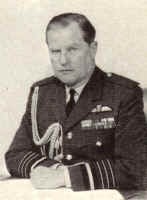 |
3 October 1973 to 30 May 1978 | Sir John Grandy John Grandy Marshal of the Royal Air Force Sir John Grandy GCB GCVO KBE DSO KStJ RAF was a senior officer in the Royal Air Force... , Governor |
|
| |30 May 1978 to 1981 | Sir William Jackson, Governor |
British dependent territory (1981)
| Picture | Term | Incumbent | Notes |
|---|---|---|---|
| |1981 | Gibraltar becomes a British dependent territory British overseas territories The British Overseas Territories are fourteen territories of the United Kingdom which, although they do not form part of the United Kingdom itself, fall under its jurisdiction. They are remnants of the British Empire that have not acquired independence or have voted to remain British territories... |
Under the British Nationality Act 1981 British Nationality Act 1981 The British Nationality Act 1981 was an Act of Parliament passed by the British Parliament concerning British nationality. It has been the basis of British nationality law since 1 January 1983.-History:... |
|
| |1981 to 26 October 1982 | Sir William Jackson, Governor | ||
| |26 October 1982 to 19 November 1985 | Sir David Williams David Williams (Royal Navy officer) Admiral Sir David Williams GCB was a senior officer in the British Royal Navy.-Naval career:Williams was appointed Second Sea Lord and Chief of Naval Personnel in 1974; he was then Commander-in-Chief Naval Home Command from 1976 to 1979 when he retired.Between 1980 and 1982 he was Chairman of the... , Governor |
||
| |19 November 1985 to December 1989 | Sir Peter Terry Peter Terry Air Chief Marshal Sir Peter David George Terry GCB is a retired senior Royal Air Force commander.-Royal Air Force career:... , Governor |
||
| |December 1989 to April 1993 | Sir Derek Reffell Derek Reffell Admiral Sir Derek Roy Reffell KCB is a former Governor of Gibraltar.-Naval career:Educated at Culford School, Reffell entered the Royal Navy, qualified as a Navigating Officer in 1954 and progressed through the ranks: he commanded the frigate, HMS Sirius, from her launch in 1966, and served as... , Governor |
||
| |April 1993 to 5 December 1995 | Sir John Chapple John Chapple Field Marshal Sir John Lyon Chapple, GCB, CBE was a career British Army officer in the second half of the 20th century. He served as Chief of the General Staff, the professional head of the British Army, from 1989 to 1992.-Army career:... , Governor |
||
| |5 December 1995 to 19 February 1997 | Sir Hugo White Hugo White Admiral Sir Hugo Moresby White GCB CBE is a former Governor of Gibraltar.-Naval career:Educated at the Dragon School in Oxford, the Nautical College, Pangbourne and the Britannia Royal Naval College, White was commissioned into the Royal Navy in 1960.He was appointed Commanding Officer of the... , Governor |
||
| |24 February 1997 to 5 April 2000 | Sir Richard Luce, Governor | ||
| |5 April 2000 to 2002 | David Durie David Durie Sir David Robert Campbell Durie KCMG is a retired British civil servant, whose last major public appointment was as Governor of Gibraltar.-Career:... , Governor |
British overseas territory (2002)
| Picture | Term | Incumbent | Notes |
|---|---|---|---|
| |2002 | Gibraltar becomes a British overseas territory British overseas territories The British Overseas Territories are fourteen territories of the United Kingdom which, although they do not form part of the United Kingdom itself, fall under its jurisdiction. They are remnants of the British Empire that have not acquired independence or have voted to remain British territories... |
Under the British Overseas Territories Act 2002 British Overseas Territories Act 2002 The British Overseas Territories Act 2002 is an Act of the Parliament of the United Kingdom, which superseded parts of the British Nationality Act 1981... |
|
| |2002 to 16 May 2003 | David Durie David Durie Sir David Robert Campbell Durie KCMG is a retired British civil servant, whose last major public appointment was as Governor of Gibraltar.-Career:... , Governor (Sir David Durie from 1 Jan 2003) |
||
| |16 May 2003 to 27 May 2003 | David Blunt, acting Governor | ||
| 27 May 2003 to 17 July 2006 | Sir Francis Richards, Governor | ||
| |17 July 2006 to 27 September 2006 | Philip Barton, acting Governor | ||
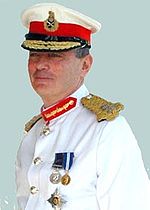 |
27 September 2006 to 21 October 2009 | Sir Robert Fulton, Governor | |
| |21 October 2009 to 26 October 2009 | Leslie Pallett, acting Governor | ||
| 26 October 2009- | Sir Adrian Johns Adrian Johns Vice Admiral Sir Adrian James Johns KCB, CBE, KStJ, ADC is the current Governor of Gibraltar and a former senior officer in the Royal Navy. His most senior naval posting was as Second Sea Lord from 2005 to 2008.-Career:... , Governor |
See also
- The ConventThe Convent (Gibraltar)The Convent has been the official residence of the Governor of Gibraltar since 1728. It was originally a convent of Franciscan friars, hence its name, and was completed in 1531....
- Chief Minister of GibraltarChief Minister of GibraltarThe Chief Minister of Gibraltar is the leader of the largest party elected to the Gibraltar Parliament, and is formally appointed by the Governor of Gibraltar, representative of the British Crown.-List of Chief Ministers:...

